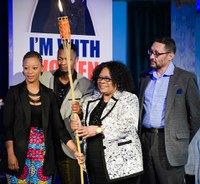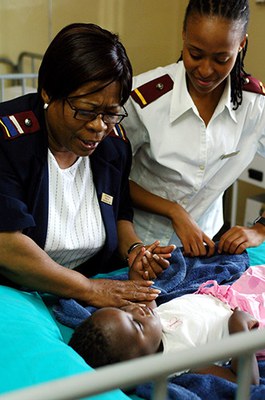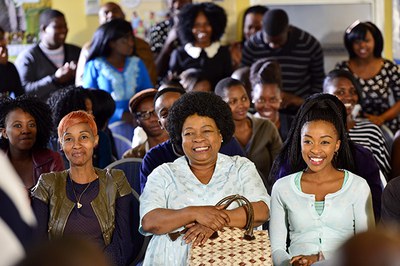
Lillian Dube tells international summit "Soul City saved my life"

I’m thrilled to have been invited to share my insights on how we can change social behavior through the power of communication.
Two weeks ago, our Mother of the Nation, Winnie Mandela passed away. As a feminist icon, she said: "The overwhelming majority of women accept patriarchy unquestioningly and even protect it, working out the resultant frustrations not against men but against themselves in their competition for men as sons, lovers and husbands. Traditionally the violated wife bides her time and off-loads her built-in aggression on her daughter-in-law. So men dominate women through the agency of women themselves."
Today, like Ma Winnie, we must ask ourselves: how do we change social norms? How do we change people’s entrenched behaviors, stir hearts and minds -- and energize people’s souls? How do we amplify – project - the voices of those who are fighting daily for the lives of others in the trenches of development work?
I don’t have answers to every question posed here. But I can share my story of how diverse and innovative approaches can be used to change social behavior.
This is an audacious story of how, together, the education entertainment industry, creative media production, and civil society advocacy equipped me to make a difference.
It began when I landed my much loved alter ego role as ‘Sister Bettina’ in South Africa’s iconic Soul City television series.
 Soul City was a game-changer. It challenged and transformed South African social norms, patriarchal attitudes and practices in bold and exciting ways. Without preaching or condescension, we tackled tough issues and taboos. These included domestic violence, sexual wellbeing, and showing women that they can have control of their bodies away from the oppression of the past.
Soul City was a game-changer. It challenged and transformed South African social norms, patriarchal attitudes and practices in bold and exciting ways. Without preaching or condescension, we tackled tough issues and taboos. These included domestic violence, sexual wellbeing, and showing women that they can have control of their bodies away from the oppression of the past.
Through the ‘soft power’ of entertainment, we sought to empower individuals and communities to make informed and healthy decisions.
Over and above being a television personality, I thank God for giving me a gift to connect with people. This gift came to the fore during one of the bleakest moments of my life. Oscar Wilde memorably said, “Life imitates art far more than art imitates life”. The importance of this hit me when I received my diagnosis for breast cancer.
I will never forget the day the news was confirmed by the doctor. But neither I - nor Sister Bettina – believed our journey was done.
This is why I stand before you today as a cancer survivor.
As a woman who battled and PREVAILED over this disease, I’ve dedicated the rest of my day to be an awareness activist.
It’s been a huge privilege to have been present in the living rooms of millions of South Africans. I never once took it for granted. Sister Bettina not only held out a lifeline to Soul City fans throughout South Africa; I owe her my own discovery of cancer.
Thanks to Soul City’s information on breast cancer I had begun to conduct self-examinations. This practice helped me detect a lump in my breast early enough to ensure I was able to stop the disease in its tracks.
There has also been laughter and fun along the journey. Because laughter can really be the best medicine. “I love helping people. If I can’t lend a hand, then I at least want to be able to make them laugh” has been my tag line.
Throughout four decades in the entertainment industry, none of my many roles have impacted the nation like Sister Bettina did. The Soul City production ran for many years in Southern Africa in a partnership with the public broadcaster, SABC.
Still today, many fans of the television series have told me how Sister Bettina has made them think about their behavior.
I was at the bank counter once when I was approached by a man who told me that he had seen himself reflected in one of the characters involved in domestic abuse. Until he saw the show, he hadn’t realized how ugly his behavior was. This gentleman was, I believe, redeemed.
Then there are times to be strategically silent. There was a period when Sister Bettina didn’t feature in the series when we were focusing on safe sex.
We realized that no one was going to listen to an old person preaching about condom use. They just wouldn’t be able to relate. Preaching, in fact, was never welcome on Soul City.
It was more about “edutainment”. The goal is to educate people while entertaining them. This is what you, the experts call “an Entertainment education approach”.
The series was developed during a time when there was not a strong focus on HIV awareness and sexual health by the government and we sought to deliver this in our narrative, with a strong focus on showing the experiences of students and people living in hostels.
The Soul City Institute and many charitable organizations have leveraged my stature and voice as sister Bettina -- as well as many other voices within communities to champion many causes. The common golden thread is to change the behavior of individuals within these communities.
Some of the ‘best and the brightest’ have conducted extensive research on these complex social issues. As someone who lacks scholarly training, my approach is quite simple. Sometimes simple works, and sometimes it doesn’t.
 Exploring every side of a subject is essential. By taking different approaches to reflect the different practices and norms within diverse societies, a ‘one-size-fits-all’ approach might not be the answer to the challenges we face when it comes to What Works.
Exploring every side of a subject is essential. By taking different approaches to reflect the different practices and norms within diverse societies, a ‘one-size-fits-all’ approach might not be the answer to the challenges we face when it comes to What Works.
My story informs me that there are a number of fundamental ingredients when one explores the issues around shifting social norms and changing behaviors.
There are of course commonalities in communities everywhere. Digital technology, the so-called “information superhighway”, iPhones, Snapchat and Netflix have all impacted how we communicate and receive and digest information.
The challenge is to understand how these technology impacts each community differently. And then to ask how we can amplify the voices that can be harnessed to bring about behavioural change.
Nelson Mandela was one voice that became, for a brief shining moment, the world’s conscience. He never hesitated to use his stature among world leaders to question wrongdoing and injustice; and to speak truth to power.
In closing, I’m happy to report back that the South African government today has a much stronger focus on communicating key messages; leveraging the social media; and amplifying key voices within communities. It has embarked on a massive HIV/AIDS treatment campaign. Together, we are positively changing societal behavioral norms.
Our government, in partnership with civil society groups, is slowly getting to grips with the rapid changes of how people consume information.
In short, we are rebranding HIV in the public eye so that it is no longer seen as a death sentence but rather a manageable condition if met with the relevant treatment. This is a battle that is not fought in the hospital but rather in the home, where televisions and cellphones introduce new ideas and identities to the narrative of HIV.
The convergence of traditional communication approaches with the new digital technologies has the potential to help bring about a HIV/AIDS free generation in our lifetime.
Thank you for the opportunity to share with you how diverse voices within communities – and an edutainment approach - can drive social behavior changes.
I will leave you - the experts - to explore the other themes of this conference.
